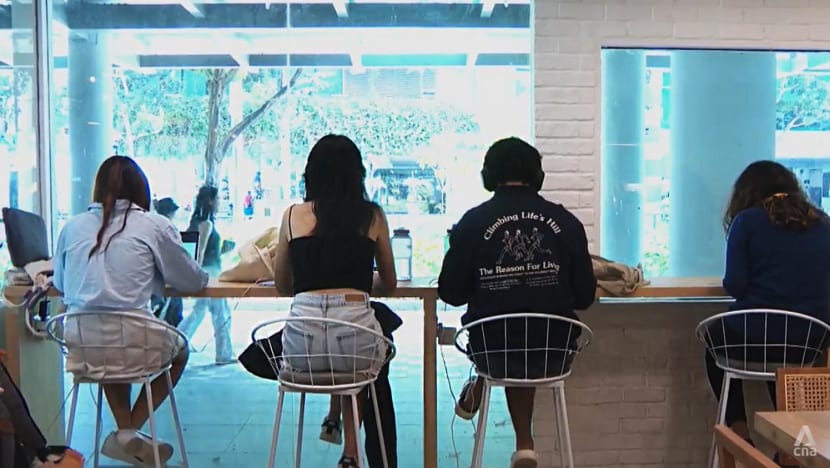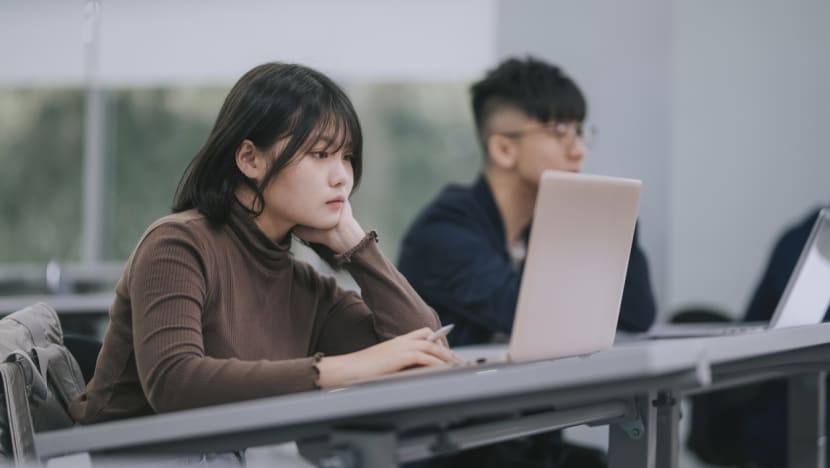Commentary: How hustle culture is robbing our youths of self-discovery
Pausing to reflect feels like stagnant inactivity, but it’s crucial for our youths, says NUS lecturer Jonathan Sim.


This audio is generated by an AI tool.
SINGAPORE: Recently, one of my students returned from an overseas exchange programme. He excitedly shared with me a new discovery he made. “For the first time in my life,” he said, “I learned to reflect.”
This was not an isolated incident, but a window into a silent crisis in the culture of our youths here in Singapore.
In my past seven years as an educator, I am seeing increasingly more students come to higher education without having truly engaged in self-reflection. Numerous students have echoed this sentiment, some even seeking guidance from me on how to introspect.
WHAT IS THE COST OF HUSTLE CULTURE?
My own reflections (ironically) into this puzzling phenomenon reveal a startling truth: Every student I spoke to pointed to the hustle culture they are engulfed in – it is a culture of constant achievement, pressuring them to constantly chase measurable outcomes, be it grades, accolades, or portfolio enhancements.
Introspective activities are sidelined because pausing to reflect feels like stagnant inactivity – introspection does not seem to contribute directly to any measurable progress. They struggle to recognise the subtle yet profound impact that self-reflection can bring simply because these effects cannot be easily or immediately measured.
This problem is compounded by our hyperconnected and fast-paced world, where the never-ending notifications of digital communications and the demands of daily life leave us little time for any reflection. When time is such a scarce resource, more urgent tasks take priority.
SO WHAT IS SELF-REFLECTION AND WHY IS IT IMPORTANT?
Real personal growth and maturity requires time. When we set aside time to reflect, we give ourselves the space to learn more about ourselves so that we can grow personally and develop emotional maturity.
On good days, I am able to spend half an hour in the morning, penning my thoughts in a journal – I find that writing helps me enter a contemplative mood. Even if we are overwhelmed on busy days, setting aside just five minutes to be aware of our mood can make a big difference – it helps us understand how our moods can influence our perceptions and decisions, and it reduces the feeling that we are being swept away by events or emotions.
Reflection can be used to turn failures into valuable learning opportunities. There have been occasions where I’ve been upset because a situation did not go my way - and I found myself repeatedly blaming myself through the day. When I finally sat down to reflect, I was able to assess and identify aspects where the incident was beyond my control, play out ways I could have handled the situation differently, and from there, identify what I needed to better prepare should similar situations occur.
Reflection can also be applied to the good things in life. Sometimes we downplay our achievements, attributing them to good fortune – but this blinds us to our strengths.
As we introspect, we gain insights about our own abilities, and grow appreciative of the people and circumstances that helped make those successes possible.
In the absence of self-reflection, I have witnessed students struggle to sit alone with their thoughts, especially the uncomfortable ones. They bury themselves in work or digital distractions as an escape, creating a superficial busyness that masks an inability to process deeper emotions. This avoidance exacerbates mental stress, turning unaddressed thoughts into psychological burdens.
One concerning consequence of this lack of reflection is a tendency towards harsh self-criticism, with no opportunity for a balanced self-assessment. This breeds a dangerous belief that failure is a permanent state, an irreversible verdict of one’s capabilities – this creates a fear of failure, stifling one’s willingness to try new things.
But this did not occur in a vacuum – youths tend to mirror such behaviour from the adults around them. Adults may feel responsible for how our youths behave, that it is somehow linked to our efforts in raising them. We may take on the blame when we see them fail to perform to our expectations, because we may see their failure as our own failure. We may not realise that if we are not accepting of our youths for their mistakes, they too will not be accepting of theirs.

NOW WHAT CAN WE DO?
Initially, I struggled to find ways to encourage my students to reflect and learn from their experiences. On one occasion, a student shared that she had difficulties navigating through her thoughts in reflection. She felt that she was not getting anywhere.
I then realised that students may lack the conceptual resources necessary to guide and structure their own introspection.
I started leading by example, sharing my personal reflections with them to provide models for thorough and fair introspection. I also facilitated reflections, guiding them with structured questions to navigate their thoughts and feelings, explore additional perspectives or find new ways to reframe a situation. These equipped them with strategies and questioning methods that enabled them to introspect more deeply on their own.
For reflections to have a lasting impact, I found it useful to formalise and set aside time and space for regular reflections throughout the semester – this facilitates regularity in reflection especially for those yet to develop a habit for regular reflections.
Overall, these efforts contribute toward fostering a culture of reflection amongst my students. Many have since become more accepting of their mistakes, more willing to experiment, and more reflective about themselves and what they do.
The end of the year is a time traditionally meant for setting resolutions for the new year. We can use this as an opportunity to foster a culture of reflection in our homes, teaching our youths to use reflection as a tool for learning, growth, and self-acceptance.
A practical starting point is the Model of Reflection by Professor Gary Rolfe and his colleagues in 2001 which asks three simple questions: What? So what? And now what?
Here are some questions we can use to guide our self-reflections or to facilitate reflections with our children (they can do it as a conversation or write it in a journal) – the aim is not to be self-critical, but to fairly evaluate ourselves for growth:
What?
- … were the good and bad things that happened in the incident?
- … was I trying to achieve – did I intend for it to happen the way it did?
- … were my feelings at that time?
So what?
- … does this reveal about myself?
- … does this say about my knowledge/skills in handling the situation?
- … could I have done differently?
Now what?
- … would I say to support my best friend if he/she experienced what I did?
- … can I do to improve my ability to handle the situation if it happens again?
- … will I do the next time a similar situation arises again?
By integrating self-reflection into our daily lives, we can shift the focus away from merely doing more to becoming more – more reflective, more self-aware, and more prepared for the complexities of life. This, I believe, is a critical step toward nurturing a generation to be more emotionally and psychologically resilient, ready to face and shape their future.
Jonathan Sim is Associate Fellow of the NUS Teaching Academy and Lecturer with the Department of Philosophy at National University of Singapore.



















